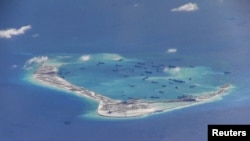The U.N. has dismissed China’s claims of "historic title" in the South China Sea. It is a major decision that comes after years of conflict among China, the Philippines and other countries.
China says ancient maps show that it legally controls nearly all the South China Sea. But Philippine officials argue that China’s territorial claims and recent aggressive activities in the South China Sea violate the United Nations Convention on the Law of the Sea (UNCLOS). The convention is an international treaty both China and the Philippines have signed.
On Tuesday, the UN Permanent Court of Arbitration in The Hague said China has “no historic title” to the area. And, the court ruled that China had violated the Philippines’ rights by interfering with that country’s fishing and oil exploration in the area.
In Manila, Philippine Foreign Secretary Perfecto Yasay called the ruling "a milestone decision."
U.S. State Department spokesman John Kirby called the ruling "an important contribution to the shared goal of a peaceful resolution to disputes in the South China Sea."
But Chinese President Xi Jinping rejected the ruling. He said it would not affect China’s control over the area or its interests there.
Years of conflict
An estimated $5 trillion in global trade passes each year through the South China Sea. The large area is home to rich fishing grounds and may include a wealth of oil, gas and other natural resources.
Many nearby countries claim part of the South China Sea. They include Brunei, Malaysia, and Vietnam, as well as the Philippines. Taiwan also has a claim.
But in recent years, China has seized and rebuilt territory in the area, despite other countries’ objections. One conflict is over China’s activities on natural reefs. It has built many into artificial islands that can support military bases.
The UN court ruled against these activities on Tuesday. It said China did not have exclusive economic rights to a disputed set of land and reefs called the Spratly Islands. And, the court said China’s construction on Mischief Reef caused permanent harm to the reef's ecosystem.
What does the ruling do?
Despite Tuesday's ruling, the UN has no way to enforce the decision. It cannot use military action or economic restrictions.
But, the decision could make other Asia-Pacific countries bring cases against China. Those cases could increase diplomatic pressure on Beijing to reduce its presence in the South China Sea.
The United States has challenged Beijing's increasing aggressiveness in the region. The U.S. military has held naval exercises in the area and deployed warships near the rebuilt reefs. The moves aim to assert the international freedom of navigation rules.
I’m Mario Ritter.
William Gallo, Richard Green, Saibal Dasqupta and Joyce Huang contributed to this report. Kelly Jean Kelly adapted it for Learning English. Hai Do was the editor.
______________________________________________________________
Words in This Story
title - n. a legal right to the ownership of land, property
ancient – adj. very old
convention – n. a formal agreement between two groups
milestone – n. an important point in the progress or development of something
exclusive – adj. not shared; available to only one person or group







